Deborah Ager's Blog, page 3
April 30, 2013
Poetry Month, Day 30*: Emilia Phillips Recommends Meacham Writers’ Workshop and FUSEBOX art&word series
More than once, after asked where I’m from, I’ll hear a co-conversationalist dare a joke about the faux-native yokelian name of my hometown, Chattanooga, Tennessee. Say what you like; you’re more than likely to mispronounce it. (It’s chae-tuh-NOO-guh or chaet-uh-NOOG-uh, depending on how quick you are on the consonant draw.) I’m ever pleased to rebuff your suspicions of no-shoes, no-shirt, no-Yanks, no-education. The town’s more than just Moon Pies, Rock City, and “Pardon me, boy . . . ”
Chattanooga sits in a valley along the Tennessee River, surrounded by mountains, where it cradles restaurants, bars, the Tennessee Aquarium, the Riverbend Music Festival, and much more. Not only has Outside Magazine consistently rated the town as one of the best cities to live in, I’m now telling you: It’s got an intimate and avid literary scene.
Case in point, unus: Meacham Writers’ Workshop, a three-day all-day junket of readings, lectures, workshops, and social gatherings. This perennial blossom’s been cultivated by poet Richard Jackson for over twenty-five years, primarily in partnership with the University of Tennessee at Chattanooga and Chattanooga State Community College. Rick now has a team of coordinators, including faculty from both institutions, as well as the always-eager writing students from UTC.
Once I was one of those students. I volunteered for the conference as a driver to the visiting writers, and it provided me with access to rare interactions with writers. I learned how to talk to writers, to ask them questions about their work, to ask for advice about grad school and beyond. As a student, this was an invaluable boon to my growth not only as a poet but as a citizen of the poetry community. The conference isn’t just for the students, however; it’s free and open to the public. And if you’re anywhere within a four-hour radius of Chattanooga, I suggest you go. Buy books. Talk—actually talk—to writers. (Check out a list of their past guests.) Ask Rick for a wine recommendation. Shake out those little bees in your bonnet: for three days, live your life for writing and writing only.
Of course, I’m biased. And nostalgic. Which brings me to my next counsel—something new, something that attests to the growth of Chattanooga as a hub for literary, visual, and performing arts in the Southeast. Now introducing: the FUSEBOX art&word series, a year-old reading series that’s happening on a near-monthly basis.
Meet Aubrey Lenahan, founder of the program and graduate of UNC–Greensboro and George Mason University, a hella-stylish poet herself. You may ask, How does she bring in the likes of Matt Hart and Jenny Sadre-Orafai and other scribblers from the far-flung states of the nation?
A. Out of her own pocket. And donations.
That’s part of the miracle of the program, a testament to Lenahan’s tenacity and insistence that Chattanooga have a literary scene throughout the year, beyond the biannual Meacham conference. It’s unpretentious, stylistically diverse, and solicitous of the audience and readers’ needs. Now hosted in the Folk School of Chattanooga, one feels as if literature does indeed speak to other forms of art. How do you find out more? Facebook’s your best bet, although I’ve heard rumors that they’re expanding their online presence in the near future.
The longer I’ve been writing and working with journals, the more I’ve become aware of how important good citizens of our community are, like those who run the Meacham Writers’ Workshop and FUSEBOX art&word. So often, after toiling over a few words and nitpicking our writing decisions, we feel we deserve praise, and we do, but let’s not forget to give the laurels to our champions, too, beyond National Poetry Month, beyond this venue.
—Emilia Phillips
*Throughout Poetry Month 32 Poems will use this space to praise presses, journals, and readings series that bring poetry to us in a special way. Our hope is that we can point new fans in their direction and publicly thank editors and curators for their work. Check in with us again tomorrow for another poet’s recommendation.
↔
 Emilia Phillips is the author of Signaletics (University of Akron Press, August 2013) and the prose editor of 32 Poems. She teaches poetry at Virginia Commonwealth University and, in August, will join Gettysburg College as the 2013–2014 Emerging Writer Lecturer.
Emilia Phillips is the author of Signaletics (University of Akron Press, August 2013) and the prose editor of 32 Poems. She teaches poetry at Virginia Commonwealth University and, in August, will join Gettysburg College as the 2013–2014 Emerging Writer Lecturer.
April 29, 2013
Poetry Month, Day 29*: Carol Light Recommends Poetry Northwest
Hovering between 45 and 55º Fahrenheit, the waters of Puget Sound seldom welcome even the most intrepid swimmer, and June is most commonly known as Junuary. Coffee isn’t the only counter-measure. Meet Poetry Northwest: a literary hot springs with an illustrious history. Richard Hugo and Carolyn Kizer left their imprint on the magazine, and David Wagoner ably edited it for 36 years, until 2002. After a three year hiatus, David Biespiel revived the journal in 2006, and Kevin Craft (since 2010) is its current editor. Poetry Northwest’s web presence, unbounded by geography, includes snapshots from the print edition of the magazine and notes from a literary community in lively conversation.
—Carol Light
*Throughout Poetry Month 32 Poems will use this space to praise presses, journals, and readings series that bring poetry to us in a special way. Our hope is that we can point new fans in their direction and publicly thank editors and curators for their work. Check in with us again tomorrow for another poet’s recommendation.
↔
 Carol Light’s first book, Heaven from Steam, will be published in 2013 by Able Muse Press. Her poems have appeared in Narrative Magazine, Poetry Northwest, American Life in Poetry, Literary Bohemian, and elsewhere. She lives with her family in Port Townsend, Washington.
Carol Light’s first book, Heaven from Steam, will be published in 2013 by Able Muse Press. Her poems have appeared in Narrative Magazine, Poetry Northwest, American Life in Poetry, Literary Bohemian, and elsewhere. She lives with her family in Port Townsend, Washington.
April 28, 2013
Poetry Month, Day 28*: Lilah Hegnauer Recommends The Blue Pencil Online
One of the online literary journals I love most, The Blue Pencil Online, is edited and produced by high school students and publishes the writing of people who are 12-18 years old. The students of the Walnut Hill School for the Arts in Natick, Massachusetts pride themselves on publishing the best fiction, poetry, and nonfiction written by teenagers from around the world. Reading their issues always impresses and heartens me—not only because the quality of the writing is so good, but also because The Blue Pencil Online serves such an important role in the lives of those who edit it and those who are published there.
They also have a storied past. Long before it was an online journal, The Blue Pencil was edited by Elizabeth Bishop, who was a student at Walnut Hill from 1927-1930. In her honor, the magazine gives its annual Elizabeth Bishop Prize to the writers of the best fiction and poetry submissions from the past year. This prize is a $3000 full tuition scholarship to the Walnut Hill Summer Writing Program.
Having taught high school poets in the UVA Young Writers Workshop, I know how eager they are to be taken seriously as writers and to have a distinguished forum for publishing their work. I can’t help but think back at my own teenage self and wonder at how important places like TBPO (and the UVA YWW) would have been to me.
I’ll leave you with this gem of an ending from “1959,” a poem by this year’s Elizabeth Bishop Prize winner in poetry, Ian Burnett: “perhaps he knew the South / was going out like a filament and / was afraid to / let himself burn with it.”
—Lilah Hegnauer
*Throughout Poetry Month 32 Poems will use this space to praise presses, journals, and readings series that bring poetry to us in a special way. Our hope is that we can point new fans in their direction and publicly thank editors and curators for their work. Check in with us again tomorrow for another poet’s recommendation.
↔
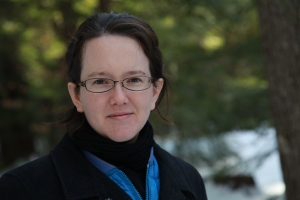
Lilah Hegnauer is the author of Dark Under Kiganda Stars (Ausable Press 2005). She lives in Charlottesville, Virginia, where she teaches poetry and American literature at James Madison and UVA. She is the 2013 Amy Clampitt resident in Lenox, MA.
April 27, 2013
Poetry Month, Day 27*: Carolina Ebeid Recommends Likestarlings
I want to introduce the collaborative poetry website Likestarlings, which is unlike many web-based journals that I have seen. Perhaps because it isn’t a journal, exactly; it is not published in regular intervals like a quarterly, nor is the work selected in the conventional manners. The Likestarlings editors pair poets together who agree to collaborate on a “folio” of six new poems, usually taking the form of a call and response, each writer having a turn to answer. These are essentially “conversations in poems,” as the editors like to say. Sometimes the poems within a pairing are published as each turn is completed, so that the attentive reader can see the conversation unfolding over a span of weeks, months maybe. Time becomes visible in that way.
Likestarlings was begun in 2009 by Caleb Klaces, a terrific British poet I met in Austin, TX. The poetry editors are David Hawkins in the UK, and Jeffrey Pethybridge in the US. While most of the collaborations have been between British poets, or between North American poets, there is always the happy occasion when the poem exchange takes place across the Atlantic. We are waving to each other from our continents. Likestarlings plumbs the nature of correspondence and collaboration while proliferating the very act. How is the poem a meeting ground, a place for slowing and listening? Likestarlings offers a space for experimentation (though isn’t all writing experimental?). They welcome statements on correspondence, dialogue, the possibilities of poetic address, etc. in their prose section edited by poet-scholar Anat Bensvi. She calls these slant/angled poetics.
Here are some recent collaborations and essays that I find engaging, though the entire archive is a treasure-house. Truly!
Brian Blanchfield & Richard Siken
Ishion Hutchinson & Rowan Ricardo Phillips
Kirun Kapur & Sarah Howe
Benjamin Paloff & Jon Woodward
Jessica Murray & Jennifer Moxley
Joshua Marie Wilkinson & Hoa Nguyen
On the Poems of Heaven by Katie Peterson
Left to a Room by Shamala Gallagher
On Epistolary Poetics by GC Waldrep
And can I have a moment to say something about the name: Likestarlings! Isn’t it a glory? It is an imperative and half-simile all at once! Yes, I’m already fond of starlings, thank you. How is anything like a starling-flock? I’ve only seen them in video––the lot of them in flight making something of a cloth that billows then folds and pivots back. Synchronicity, change, splendor! This has much to do with poetry! Here’s something on youtube:
—Carolina Ebeid
*Throughout Poetry Month 32 Poems will use this space to praise presses, journals, and readings series that bring poetry to us in a special way. Our hope is that we can point new fans in their direction and publicly thank editors and curators for their work. Check in with us again tomorrow for another poet’s recommendation.
↔
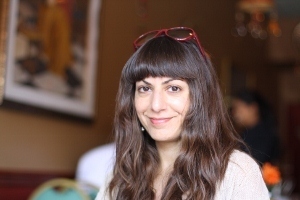
Carolina Ebeid was selected as the 2012-2014 Stadler Fellow at Bucknell University, where she works on the editing staff of West Branch. She holds a degree from the Michener Center for Writers. She is also a 2011 CantoMundo Fellow. Her work has appeared or is forthcoming in The Kenyon Review, Poetry, Crazyhorse, Gulf Coast, Anti-, Forklift, Ohio; 32 Poems, Indiana Review and other journals.
April 26, 2013
Poetry Month, Day 26*: Dana Levin Recommends The Laurel Review and Green Tower Press
We all do it: try to trap various lit-mags in graspable cages like first tier, second tier, conservative, experimental—but I’m always interested in lit-mags that slip the trap. The Laurel Review, edited by John Gallaher and Richard Sonnenmoser, is one of these. Regularly publishing work that runs the gamut from the conventional to the eccentric, I am always impressed by the range of voices this little magazine from Northwest Missouri State presents twice a year to those in the know. Get in the know! You’ll find the feeling science of C. John Graham, the short lyric jewels of Dan George, the strange fairytale worlds of Rosalynde Vas Dias, who, in Issue 46.1, offers us a pirate without a ship, a cat-eye marble turning into an oriole’s eye, a model who literally shrinks under the gaze of a miniaturist. Such new voices comingle with those of some of our more interesting established poets: Cole Swensen, Matthew Zapruder, Troy Jollimore and Jenny Browne, to name a few.
The Laurel Review is published by Green Tower Press, which also runs the Midwest Chapbook Contest every year: the winner receives $250, a one -year subscription to the magazine, and an all-expenses-paid trip to read at Northwest Missouri State. I had the pleasure of judging this contest in 2011 and found the intriguing poetry of Elizabeth Clark Wessel. I was just as delighted by the finished chapbook: hand-stitched, turquoise green, with a terrific cover image. Check out the photo: ain’t it cool?
—Dana Levin
*Throughout Poetry Month 32 Poems will use this space to praise presses, journals, and readings series that bring poetry to us in a special way. Our hope is that we can point new fans in their direction and publicly thank editors and curators for their work. Check in with us again tomorrow for another poet’s recommendation.
↔
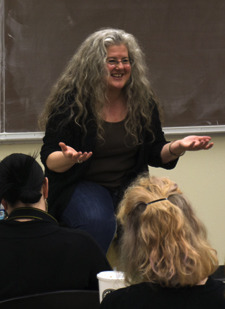 Dana Levin is the author of In the Surgical Theatre, Wedding Day, and Sky Burial, which The New Yorker called “utterly her own and utterly riveting.” Levin’s poetry and essays have appeared recently in The New York Times, Los Angeles Review of Books, APR, Agni, and Poetry. A recipient of fellowships and awards from the Rona Jaffe, Whiting and Guggenheim Foundations, Levin teaches at Santa Fe University of Art and Design and in the Warren Wilson College MFA program.
Dana Levin is the author of In the Surgical Theatre, Wedding Day, and Sky Burial, which The New Yorker called “utterly her own and utterly riveting.” Levin’s poetry and essays have appeared recently in The New York Times, Los Angeles Review of Books, APR, Agni, and Poetry. A recipient of fellowships and awards from the Rona Jaffe, Whiting and Guggenheim Foundations, Levin teaches at Santa Fe University of Art and Design and in the Warren Wilson College MFA program.
April 25, 2013
Poetry Month, Day 25*: Joshua Robbins Recommends Blackbird’s Larry Levis Features
I have a recording of Larry Levis reading “Poem Ending with Hotel on Fire” made some time, I think, in the early ‘90s. In his banter before reading the poem, Levis recounts a story about a friend who criticized his work by saying things like, “Your poems are sooooo autobiographical,” to which Levis responds in the recording, “Well…at least I had a life.”
I feel fortunate to have this recording because it has served to ground much of my own reading of this poet who, in recent years, has been admired to the point of his work becoming trendy. But don’t get me wrong. I don’t fault Levis’s work for this phenomenon. I fault how we read it. And that’s what leads me to my recommendation: Blackbird’s Larry Levis features.
Dig around in the archive some. There’s a trove of valuables just a few clicks away. Here’s just some of what you’ll find if you put in the time:
Rare audio of Levis reading:
“Elegy with a Bridle in Its Hand”
“Winter Stars”
“Caravaggio: Swirl & Vortex”
“In 1967”
“Some Grass Along a Ditch Bank”
Facsimile drafts of “Elegy with an Angel at Its Gate”
Previously unpublished work:
“The Space”
Rare video of Levis reading:
“Elegy with a Thimbleful of Water in the Cage”
“Poem Ending with a Hotel on Fire”
David Freed’s Drawings of Levis
Read Blackbird. Trace its Levis reading loops. Listen to the Levis Reading Prize recordings. Track his influence.
Let’s get back to the man and his work. The legend can take care of itself.
—Joshua Robbins
*Throughout Poetry Month 32 Poems will use this space to praise presses, journals, and readings series that bring poetry to us in a special way. Our hope is that we can point new fans in their direction and publicly thank editors and curators for their work. Check in with us again tomorrow for another poet’s recommendation.
↔
 Joshua Robbins is the author of Praise Nothing (University of Arkansas Press, 2013). He teaches creative writing and literature at the University of Tennessee. His poems have appeared or are forthcoming in 32 Poems, Mid-American Review, Copper Nickel, Southern Poetry Review, Anti-, and elsewhere.
Joshua Robbins is the author of Praise Nothing (University of Arkansas Press, 2013). He teaches creative writing and literature at the University of Tennessee. His poems have appeared or are forthcoming in 32 Poems, Mid-American Review, Copper Nickel, Southern Poetry Review, Anti-, and elsewhere.
April 24, 2013
Poetry Month, Day 24*: David Wright Recommends WordFarm
Since publishers Andrew Craft and Sally Sampson Craft began WordFarm in 2002, the small press has published 21 titles, including non-fiction and fiction by Alan Michael Parker, Stacy Barton, Paul Willis, and Jessie van Eerden. But two-thirds of WordFarm’s titles have been poetry collections. These artfully designed books contain voice both varied and indicative of the press’ important aesthetic and approach to publishing contemporary verse.
One identifying element of WordFarm’s approach is a willingness to confront and include matters of belief. Luci Shaw, John Leax, and Paul Willis have long been writing poems that have offered challenge and solace to readers within American Protestant circles, and their collections for WordFarm have given their work an opportunity to find readers beyond that faithful niche. At the same time, WordFarm’s poets also include writers whose work, while earnest and concerned with ultimate questions, bears more tell-tale marks of doubt and surprise than of belief. The science fiction-like work in Rane Arroyo’s The Roswell Poems and Bryan Dietrich’s The Assumption represent two of the press’ gestures towards inquiry over settledness.
Two poets in particular represent the best of WordFarm’s work at this juncture of poetic belief and honest doubt. Erin Keane’s two collections, The Gravity Soundtrack and Death Defying Acts, grit their way through a whole panoply of lyrical and broken characters. The dramatic monologues of various circus folk in the second collection draw on Keane’s engagement with theater (she is also a playwright and drama critic), and this shows in Keane’s evocation of character through the use of both vernacular and lyrical language. It’s hard not to share the existential dilemma of the tattooed lady who speaks in five of the book’s poems, beginning with her “Lectio Divina”: “outlining this rollercoaster / of a body” and ending with her worry that “Some day I’ll run out of skin.” Keane never gives in to an easy version of hope, but her poems still contain a deep, humane desire to offer something more to the reader than cleverness or skill. “Grievous Angel,” the final piece in her first collection, is a direct and smart and devastating look at the strange death of musician Gram Parsons. And it’s a wonderful way, too, of thinking about what poems can offer us, even in the face of loss. “I couldn’t give you / anything to hold” says the speaker, as he considers the uncertainty of our stories, but he can offer the poem: “so take this wakeful night/ know it can’t make sense. What’s left? At least / make it a good story. An offering, one last.”
The second poet at this juncture, perhaps with a foot more firmly on the road to belief, is Tania Runyan and her collection A Thousand Vessels. In her evocations of ten biblical women—Ruth, Sarah, Dinah, and Eve among them, Runyan contends with the possibility that “God creates women for no reason / but grief. He can’t cry himself / and needs a thousand vessels for his tears” as Mary says while watching her son die. To measure these tears, Runyan weaves back and forth between her biblical meditations and equally candid considerations of contemporary married and domestic life. After a poem about Boaz eyeing Ruth, Runyan shifts to “Honeymoon at Monterey Bay” where a contemporary young couple struggles to become familiar with one another as husband and wife. A little shy, still, about their return to the hotel room, they stop at a “long counter of microscopes” and intimately take “turns behind the lens, the skeletons / forming a latticework of cones and spheres, / silica arrows weaving through the openings, / holding the bodies together for good.”
The dialogues created within and between books like Keane’s and Runyan’s work reflect the vision of the publishers and the sensibility of poetry editor, Marci Rae Johnson. The resulting books are beautifully designed (by Craft) and thoughtfully edited. And the press’ literary range is expanding with two recent anthologies, one a collection of essays on the work of W. S. Merwin edited by Jonathan Wienert and Kevin Prufer and the other a collection of highlighted work from the first ten years of 32 Poems. Future work scheduled to appear includes Jeanne Murray Walker’s New and Selected Poems in the coming year.
—David Wright
*Throughout Poetry Month 32 Poems will use this space to praise presses, journals, and readings series that bring poetry to us in a special way. Our hope is that we can point new fans in their direction and publicly thank editors and curators for their work. Check in with us again tomorrow for another poet’s recommendation.
↔
 David Wright’s poems have appeared in Ecotone, Image, Poetry East, and Hobart, among others. In 2003, he published A Liturgy for Stones (Cascadia) and was awarded an Illinois Arts Council Artist’s Fellowship for Poetry. Most recently he has taught at Wheaton College (IL) and the University of Illinois Urbana-Champaign. In the fall he’ll begin a new position teaching creative writing and American literature at Monmouth College (IL). You can find him online at http://sweatervestboy.tumblr.com
David Wright’s poems have appeared in Ecotone, Image, Poetry East, and Hobart, among others. In 2003, he published A Liturgy for Stones (Cascadia) and was awarded an Illinois Arts Council Artist’s Fellowship for Poetry. Most recently he has taught at Wheaton College (IL) and the University of Illinois Urbana-Champaign. In the fall he’ll begin a new position teaching creative writing and American literature at Monmouth College (IL). You can find him online at http://sweatervestboy.tumblr.com
April 23, 2013
Poetry Month, Day 23*: Dan O’Brien Recommends CB Editions
Charles Boyle and his one-man operation CB Editions in London came to my attention because he was willing to publish me. What drew him to my work is what I find so compelling and refreshing in Boyle’s small but potent catalog (which includes a few pseudonymous books by Boyle himself—I won’t tell you which): a passion for the genre-crossing, or genre-defying, writing.
The two CB books I read first—and they knocked my socks off—are J.O. Morgan’s Natural Mechanical, an epic poem of an Isle of Skye childhood, and Jack Robinson’s Recessional, an angry, poignant, humorous collection of prose poems (or micro-fictions?) paired with the author’s photographs about life in Shepherd’s Bush in the first days of the Great Recession. Prose poems paired with photographs that accrue like a novel, poetry with the unity and heft of biography. No wonder Boyle has sympathy for a playwright who writes poems about a journalist.
A deeply gifted writer himself, Boyle had years of experience in publishing and as an editor at Faber & Faber before starting CB Editions in 2007. He and his press has the courage—and the challenges too, Boyle would add—of the idiosyncratic, the iconoclastic, the passionate and honest voice.
—Dan O’Brien
*Throughout Poetry Month 32 Poems will use this space to praise presses, journals, and readings series that bring poetry to us in a special way. Our hope is that we can point new fans in their direction and publicly thank editors and curators for their work. Check in with us again tomorrow for another poet’s recommendation.
↔
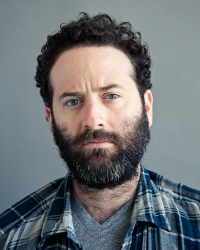 Dan O’Brien’s debut poetry collection War Reporter is forthcoming in September 2013 from Hanging Loose Press in Brooklyn and CB Editions in London. O’Brien’s poems have appeared in 32 Poems, Poetry Review, Missouri Review, North American Review, White Review, and elsewhere. His play The Body of an American about combat journalist Paul Watson recently won the inaugural Edward M. Kennedy Prize for Drama. He will teach playwriting this summer at the Sewanee Writers’ Conference. (Photo by David Bornfriend)
Dan O’Brien’s debut poetry collection War Reporter is forthcoming in September 2013 from Hanging Loose Press in Brooklyn and CB Editions in London. O’Brien’s poems have appeared in 32 Poems, Poetry Review, Missouri Review, North American Review, White Review, and elsewhere. His play The Body of an American about combat journalist Paul Watson recently won the inaugural Edward M. Kennedy Prize for Drama. He will teach playwriting this summer at the Sewanee Writers’ Conference. (Photo by David Bornfriend)
April 22, 2013
Poetry Month, Day 22*: Shara Lessley Recommends Tavern Books and Poets House
After nearly three years as a resident of Amman, Jordan, there are certain stateside conveniences that call to me—access to fresh tomatillos and blueberries, for instance, green grass in public parks. Still, one of the things I miss most as an ex-pat living in the Middle East is access to public libraries. Maps, manuscripts, documents and periodicals. What a privilege it is to wander the stacks, to access with ease all that’s in circulation. Yet, so many of our U.S. libraries are in crisis, a fact made evident by shrinking hours of operation and increasingly limited holdings. With restricted budgets leaving little room for new acquisitions, access to poetry in its many forms seems more and more difficult to find, particularly for library patrons who live in rural communities.
The editors of Tavern Books, the Portland-based nonprofit literary arts organization and publisher specializing in poetry translation and collections long out-of-print, recognize this fact and have responded by establishing Poetry State. The program, which serves institutions in major cities, as well as rural and tribal communities, strives to supplement the offerings of Oregon libraries. Poetry State also provides books to alternative-lending programs including those housed in shelters, drug and alcohol treatment centers, and jails. Although many of the materials that Poetry State offers are donated by publishers and individual poets, the press also accepts monetary contributions via its web site. According to Tavern’s Managing Editor, Natalie Garyet, Oregon’s libraries have a particular desire for bilingual editions and children’s poetry.
While Tavern Books addresses public access to poetry at the state level, Poets House offers Poetry in the Branches, a multi-faceted program geared to help librarians connect readers with contemporary verse nationwide. Poetry in the Branches provides weekend-long training sessions with special attention to library programming, as well as a sourcebook that features a step-by-step guide for implementing poetry programs on a shoe-string budget. In fact, from Brooklyn to Minneapolis, Bethlehem (CT) to Burbank (IL), there are plenty of libraries that celebrate poetry in innovative ways—and, at little expense. “Poetry Walls,” community workshops like “Writing with Rhythm!”, air time on local radio hours, and puppet shows in verse—these are but a few of the models highlighted online via the Academy of American Poets. The Academy also provides a list of low-cost suggestions for educators and librarians committed to sharing the art of poetry with audiences of all interests and ages. Happy reading!
—Shara Lessley
*Throughout Poetry Month 32 Poems will use this space to praise presses, journals, and readings series that bring poetry to us in a special way. Our hope is that we can point new fans in their direction and publicly thank editors and curators for their work. Check in with us again tomorrow for another poet’s recommendation.
↔
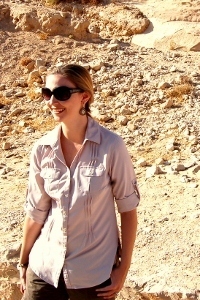
A former Stegner Fellow at Stanford, Shara Lessley is the author of Two-Headed Nightingale (New Issues 2012). Her awards include an Artist Fellowship from the State of North Carolina, the Diane Middlebrook Poetry Fellowship from the Wisconsin Institute for Creative Writing, Colgate University’s O’Connor Fellowship, The Gilman School’s Tickner Fellowship, and a “Discovery” / The Nation prize. Shara’s poems have appeared are forthcoming in Ploughshares, Crazyhorse, Southern Review, Missouri Review, Michigan Quarterly Review, and New England Review, among others. She can be reached at www.sharalessley.com.
April 21, 2013
Poetry Month, Day 21*: Marci Rae Johnson Recommends Accents Publishing
Accents Publishing, launched in 2010, has already published an impressive list of twenty-seven poetry books. Their mission, as stated on the website, is to “promote brilliant voices in an affordable publication format, and to foster an exchange of literature among different world cultures and languages.” A look around the website confirms their success in meeting both of these goals. Poets span a variety of countries and cultures, from Jeremy Paden, born in Italy, raised in Central America and the Carribean, to George Borissov who has published a number of books in Bulgarian, and Affrilachian poet Bianca Spriggs. And books start at just $5 (for chapbooks) and don’t exceed $15 (an anthology). Full length collections range from $10-$15.
At the recent AWP Conference in Boston, I bought two Accents chapbooks. Pictures of the book covers on the website imply Accents’ books are well designed, and I when I saw the books in real life I was not disappointed. Like most book lovers, I almost always judge a book by its cover. (Admit it! You do it too!) Animal Time, by Greg Pape and Reliquary, by Matthew Minicucci have a similar design: gold, slightly shimmery covers with a black and white photo or drawing on the front. Simple, yet pleasing, and they feel good in the hand.
Pape and Minicucci’s books are great examples of the range and quality of work that Accents publishes. While the style and subject matter of these two books differs widely, the quality of the poems remains steady. Reliquary explores Catholic themes (reliquary: a container for relics). Each poem is titled after a station of the cross (“Jesus Is Condemned to Death,” “Jesus Takes Up His Cross,” etc. ) and focuses on a Catholic school boy’s experience of the stations and thus of Catholic theology and culture. And while we see these experiences through the eyes of the young boy, through his voice and through the images of the poem we also hear the reflections of the grown man. Minicucci weaves this double reflection deftly throughout the book, in a way that doesn’t distract or take us out of the focus of the moment: the boy in front of the cross.
Here at the first station I was taught
to watch how Jesus’ index and middle finger separate
from the thumb, point to the sky as Pilate reads.
It is in this way we are blessed.
Caiaphas stands with his hands outstretched
fingers splayed and downward.
I was taught to see jackals here,
more than any other creature, the wine and weep
of packs, how a tongue laps the deep cut
exposed bone.
(from Figure 1: “Jesus is Condemned to Death”)
Here, images such as the shape and direction of the hands, and the “wine and weep” of the jackals do much more than provide a simple description of Figure 1: they indicate not only the theology behind this moment of Jesus’ condemnation, but also the grown narrator’s reflections on his Catholic school upbringing. Hints of violence, pain, judgment.
Greg Pape’s Animal Time features a variety of poems either directly about animals, or in which an animal appears as a minor character. Pape is a nature poet of the highest order, and this chapbook shows him at the height of his powers. In this book, Pape explores the grandeur and beauty of nature, and our humble, human place in it, which often pales in comparison to the place of animals and birds.
We have just arrived.
We are standing on the south rim
looking down, feeling our bodies slip
and fall away from us past the cliff face
into that deep space below. We feel light
and small now, our equilibrium shaken as we watch
the raven riding thermals
(From “Moment: Grand Canyon”)
Here, while we shrink at the edge and imagine our demise, the raven, completely at ease, “glides just above the rim/then drops down again.” In Animal Time, Pape constantly pushes us to remember, question, and readjust our relationship with nature and thus with ourselves and the spiritual world, as in “Bird House:” “What can I do now, but adjust my hold, re-imagine/the temple,/accept the starling as totem…”
—Marci Johnson
*Throughout Poetry Month 32 Poems will use this space to praise presses, journals, and readings series that bring poetry to us in a special way. Our hope is that we can point new fans in their direction and publicly thank editors and curators for their work. Check in with us again tomorrow for another poet’s recommendation.
↔
 Marci Rae Johnson currently teaches at Valparaiso University, where she serves as poetry editor for The Cresset and on the English department reading series committee (Wordfest). She is also the poetry editor for WordFarm press. Her poems appear or are forthcoming in Valparaiso Poetry Review, Perihelion, The Louisville Review, Phoebe, The Christian Century, Strange Horizons, and 32 Poems, among others. Her first collection of poetry won the Powder Horn Prize and will be published by Sage Hill Press later this year.
Marci Rae Johnson currently teaches at Valparaiso University, where she serves as poetry editor for The Cresset and on the English department reading series committee (Wordfest). She is also the poetry editor for WordFarm press. Her poems appear or are forthcoming in Valparaiso Poetry Review, Perihelion, The Louisville Review, Phoebe, The Christian Century, Strange Horizons, and 32 Poems, among others. Her first collection of poetry won the Powder Horn Prize and will be published by Sage Hill Press later this year.



